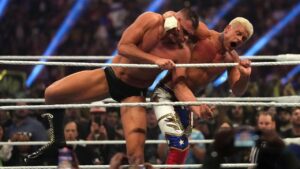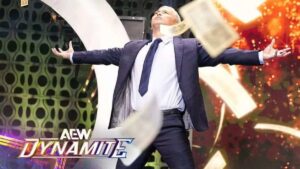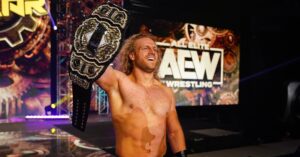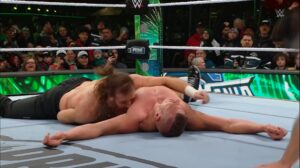Without a doubt, the breakout star of the recently revamped NXT 2.0 has been Bron Breakker, who has become a force to be reckoned with in the ring as well as an imposing presence in front of the camera. As known to many fans, Breakker comes from a hefty genetic pedigree – his father is WCW/WWE legend Rick Steiner, and his uncle is “Big Poppa Pump” Scott Steiner. When Breaker – real name Bronson Rechsteiner – originally signed with the WWE earlier this year to finally pursue the family business, it was revealed soon after he had been given the “NXT name” of Rex Steiner. The initial fan response was remarkably positive. Not only did it give him his “legacy” name that his father and uncle both utilized during their respective wrestling careers, but the first name of “Rex” also provided a cleaver play on words – said together with Steiner it was actually his real last name, and Rex is historically a name given to dogs in TV shows, movies, etc., which played into his father’s persona as “The Dog Faced Gremlin”. And then, just as NXT 2.0 hit the airwaves with its relaunch a few weeks back, out came Rex Steiner – except he was now called Bron Breakker. While the Bron is simply a shortened version of his real first name, Bronson, the last name was completely distanced from his Steiner legacy. And fans were not happy about. Being the son of one half of one of the most iconic tag teams of the past 30 years, not to mention the nephew of a former World Champion, it seemed surprising that WWE wouldn’t want to capitalize on the Steiner name, but for whatever reason WWE brass came up with, at least for the foreseeable future, Bron Breakker would be starting his pro wrestling career on his own ground (although his dialogue, reference to being a “genetic freak”, and his dog pound barking are clear direct references to both his dad and uncle). But while current fans may initially be outraged over him not following the “legacy” name of Steiner in his career path, is it really such a detriment to Bronson Rechsteiner that not having the Steiner name will end up hurting him? History would say otherwise (on a side note, Scott Steiner himself didn’t get the Steiner last name until he was two years in the business, in 1988, despite his older brother Rick being ‘Rick Steiner’ and a star in Mid-South, AWA, and NWA since 1985).
Let’s address the big elephant in the room. Yes, pro wrestling (in particular WWE) has given some multi-generation talents names that have no legacy name relation, and they have failed to become major stars. Names like Michael McGillicutty for Joe Hennig, son of WWE Hall of Famer “Mr. Perfect” Curt Hennig is just one of those examples. But even when they did finally acknowledge his family lineage in his reboot name of Curtis Axel (Curtis for his father, Curt Hennig, and Axel in tribute to his grandfather, Larry “The Ax” Hennig), it didn’t exactly elevate him much further. It was more of a case of bad booking than it was on any use (or misuse) of his family legacy. And there have been plenty of instances where the offspring of a famous wrestler has utilized the legacy name and still ended up being a less-than-Superstar – David Sammartino didn’t exactly light the world on fire like his dad Bruno did before him. And while Charlotte Flair has had great success with the Flair moniker attached to her name, it didn’t exactly prove to make her older brother David Flair into any sort of future Hall of Famer. Much like bad booking can hurt someone who does manage to use their legacy name, not exactly having the talent to be a Superstar on the level of your Hall of Fame parent won’t make you either.
Conversely, pro wrestling has long tried to capitalize on legacy names, even for wrestlers with no blood relation, in the name of kayfabe. Lance Von Erich (né William Vaughn), the “cousin” of the Von Erich family, for example, was not related to the Adkisson (Von Erich) family at all. And while the initial story of The Four Horsemen revolved heavily around the Anderson family, none of the “Andersons” were actually related. In fact, Gene Anderson was the only actual Anderson in the entire lineage of “Andersons”, but he soon found a brother Lars Anderson (né Larry Heiniemi), then another brother Ole Anderson (né Alan Rogowski), then (depending on the day) a cousin, nephew, or brother named Arn Anderson (né Marty Lunde). By the time the Four Horsemen united, Ole and Arn recruited their “cousin”, Ric Flair, who himself was the “nephew” of Rip Hawk (who was also a supposed “cousin” of the Andersons). Confused yet? And the Anderson “bloodline” continued throughout the 1980s to the early 2000s, adding other cousins, nephews, etc. such as ECW’s CW Anderson, current IMPACT/AEW star Karl Anderson, and Arn’s son Brock Anderson in AEW (Brock is actually related to Arn). So while many bloodline lineages in pro wrestling are made of large extended families, such as the Hart Family in Canada, the Anoa’i clan of Samoa, or Los Guerreros of Mexico, some legacy lineages are more fiction than fact, to begin with.
But pro wrestling has long battled that decision – arguably more so during the territorial days when you had multitudes of promoters in each region – over whether or not to officially canonize a pro wrestler with a name that directly links to their famous parents – such as Dean and Joe Simon adopting their father Boris Malenko‘s wrestling surname, or whether its best to let these progenies forge their own path. In some instances, the parent may have been a heel (or face) and the promoters may have wanted the offspring to be the opposite, and having a lineage to such a well-known villain (or hero) could influence the way the audience reacts to these newcomers. Every case is often its own individual case, whether good or bad and in many cases, they have just not worked out. But in quite a large amount of instances, these name changes – or distancing from their legacy name – have not hurt pro wrestlers quite as bad as some fans would have you believe. With that in mind, here’s a look at several pro wrestlers over the past 30 years who have found great success as pro wrestlers without having their parents’ legacy so firmly attached to their own.
Barry Windham, son of Blackjack Mulligan
When Barry Windham made his pro wrestling debut in 1979, his father Robert was already a famous pro wrestler. As Blackjack Mulligan, Barry’s father was one of the nation’s top heels as part of the nefarious group The Blackjacks (alongside Blackjack Lanza), a former WWWF World Tag Team Champion and 4x NWA United States Champion. But instead of becoming a younger Mulligan, he wrestled as Barry Windham and became his own star in Florida before signing with the WWF in 1984. He returned to the NWA in 1986 and went on to become NWA World’s Heavyweight Champion, but it wasn’t until years later that his parental lineage became widely known outside select regions. WWF finally acknowledged his lineage in 1997 when he was paired with a young Bradshaw as The New Blackjacks, but Barry Windham created quite a legacy outside of just being Blackjack Mulligan Jr.
Bray Wyatt & Bo Dallas, sons of Mike Rotunda (Irwin R. Shyster)
Speaking of Barry Windham, two of his nephews – and the sons of Windham’s early WWF tag team partner Mike Rotunda – both had strong careers without being referenced as being the sons of Irwin R. Shyster. Taylor Rotunda (Bo Dallas) was the early breakout star of the two of them, becoming NXT Champion in 2013 for 280-days in a run many NXT faithful still rave about. While his WWE main roster career was nowhere close, he did have a sizeable cult following still. Windham Rotunda (Bray Wyatt) started as Husky Harris before blossoming as Bray Wyatt (neither of which offered lineage to IRS) and became something his father never achieved – a World Champion. A 2x WWE Universal and 1x WWE Champion, Bray Wyatt achieved main event status without ever being officially recognized on-screen as the son of IRS/Mike Rotunda.
Brian Christopher, son of Jerry “The King” Lawler
While it was well known that Brian Christopher was the son of Jerry Lawler when he competed in USWA in the early 1990s, when he arrived in WWF in 1997, it was ignored. Granted, there were some very heavy innuendos and pokes at the lineage – Lawler himself was constantly putting him over despite denying his fatherly role on-screen – but NXT is doing similar with Bron Breakker with many of the little things. With the rise of the internet in the mid-90s, fans soon caught wind, and chants of “Jerry’s Kid” would fill WWF arenas, but that’s not so different as people finding out Bron is Rick Steiner’s son online but WWE not acknowledging it at first.
Carlito, son of Carlos Colon
Carlito had a successful run in Puerto Rico with his father, Carlos Colon, and WWC as Carly Colon, but when he joined WWE in 2003, he was known simply as Carlito. Not much was spoken of his lineage and it was never fully acknowledged until his family, Primo and Epico joined the WWE in 2008 that the Colon family was brought into the conversation. By then, Carlito was already a WWE Intercontinental and WWE United States Champion.
Doink The Clown, son of “Tough” Tony Borne
Matt Borne is a tougher case to crack, but it goes something like this. Matt Borne is the son of “Tough” Tony Borne, a tough-as-nails brawler who patrolled the NWA (more specifically the Pacific Northwest) from the 1950s to the 1980s. Tony joined the family business in the late 1970s and debuted in the NWA acknowledging his family lineage. He even competed for the WWF in 1985 as Matt Borne (appearing on the first WrestleMania card) and in NJPW, but when he joined WCW in 1991, he was rebranded as Big Josh and the start of his family distancing began. In 1993, he jumped to the WWF and began his most popular gimmick, that of Doink the Clown, and outside of a small growing community on internet forums, very few WWF viewers knew it was Matt Borne under the facepaint. Doink has become a cult classic character that still appears in various incarnations today, despite the fact Matt Borne passed away in 2013.
Goldust, son of Dusty Rhodes
Another one that probably would have been more “exposed” had the internet been a bigger thing than it was at the time, was when WCW’s “The Natural” Dustin Rhodes jumped to WWF in 1996 and was rebranded as the flamboyant Goldust. Sure, many online knew it was Dustin under the gold paint, but to a lot of WWF-only viewers, they had no idea that the Golden One had royal bloodlines. It wasn’t until his TV interview with Jim Ross on WWF Raw in May of 1997 that Goldust officially revealed he was the son of Dusty Rhodes, but by that time he was already a former 2x WWF Intercontinental Champion on his own bizarre merits.
Jake “The Snake” Roberts, Rockin’ Robin & Sam Houston, children of Grizzly Smith
Grizzly Smith was a huge star in the NWA from the 1950s to 1970s, but when his children entered the business, they all found their success away from the parental lineage to the former NWA star (with good reason, as this season’s episode on Dark of Side of the Ring on the Smith family exposed). Jake “The Snake” Roberts did debut as Jake Smith Jr. at first in 1975, but he quickly changed to Jake Roberts as his star rose, and by the time he became Jake “The Snake” Roberts, especially when joining WWF in 1986, his legacy name was all but forgotten to most fans. While titles were never Roberts’ forte at his peak, he created an iconic persona away from his family heritage and has easily surpassed his father as one of pro wrestling’s true icons. His brother wrestled as Sam Houston in both WWF and WCW, and while his success was nowhere near his siblings’, he did make his mark. Their sister wrestled as Rockin’ Robin and without ties to her father, she won the WWF Women’s Championship in 1988 and held it a record 502-days, which still stands today.
“Macho Man” Randy Savage, son of Angelo Poffo
Perhaps the greatest example of a Superstar transcending their legacy name is “Macho Man” Randy Savage. Savage, and his brother “Leaping” Lanny Poffo, are the real-life sons of Angelo Poffo, another rugged veteran who competed in the NWA from the late 1940s through the 1970s. While Randy initially competed as Randy Poffo in his early days, once he became Randy Savage, he exploded in the Memphis territory. He joined the WWF in 1986 and the rest is history. He became a 2x WWF World Heavyweight Champion under his own persona and to most WWF fans, they had little knowledge Savage was a Poffo or that he was brothers with “Leaping” Lanny. By the time he joined WCW in 1994, it was more well known, but Savage made his mark purely based on being his own (Macho) man than he did coasting on simply being a Poffo.
Mr. Perfect, son of Larry ‘The Ax’ Hennig
Curt Hennig followed in his father’s footsteps and became a star with AWA in the 1980s – even capturing the AWA World Heavyweight title in 1987 for 373 days. But by then, the AWA was a shell of its former self and unless you read wrestling mags or still lived in an area where AWA was televised, Hennig was largely underappreciated. When he joined the WWF in 1988, he was known simply as Mr. Perfect, with no mention of him being a Hennig. Those in the know, of course, knew, but to the mass of WWF fans who had little knowledge of the dying AWA, they had no clue he came from a wrestling family already. He became a 2x WWF Intercontinental Champion as Mr. Perfect and helped usher in a new style of wrestling in the WWF that would help reboot the WWF in the early 1990s before injuries slowed him down and he finally jumped to WCW in 1997 under his real name.
Paige, daughter of Saraya & Ricky Knight
Paige joined WWE in NXT (first with FCW, then NXT) in 2012, but the scrappy Brit’s lineage to British wrestlers Saraya and Ricky Knight was largely overshadowed. The UK wrestling scene was still a few years from exploding globally, so outside of UK indie fans, not much was known of Paige to most in North America, especially the WWE Universe. While her family is now firmly entrenched in most people’s minds – thanks in part to a feature film, Wrestling With My Family, being made about them – Paige’s initial introduction was all about her, not her legacy name.
‘Road Dogg’ Jesse James, son of ‘Bullet’ Bob Armstrong
While he did debut as Brian Armstrong, son of Southern NWA star “Bullet” Bob Armstrong, in WCW in the early 90s, when he made his debut as The Roadie in the WWF in 1995, his Armstrong connection was all but ignored. He then acquired the name Jesse James, and his more infamous moniker “Road Dogg” and became a huge star with D-Generation X in the WWF’s Attitude Era. But it took years for WWF to finally acknowledge his family legacy.
Tonga Kid, Yokozuna, Rikishi, Umaga, Rosey, Roman Reigns, & The Usos of The Anoa’i Family
The Anoa’i Clan has had so many pro wrestlers grace pro wrestling, from NWA territories to WWF, to WCW, which continues to this day. And while most of them now get instant lineage despite their names not reflecting that (such as Roman Reigns and The Usos), not everyone got that instant connection. Tama/Tonga Kid in the mid-80s, Rikishi in the 1990s, and Umaga in the 2000s were always more about their own personas, even if they did ultimately tie in their Anoi’a heritage. But the biggest omission of legacy was 2x WWF World Heavyweight Champion Yokozuna who, not only wasn’t acknowledged at the time as being Anoa’i, wasn’t even considered Samoan – he was presented as a Japanese Sumo.
While history can also show plenty who were denied their legacy names and faltered, there are also many who did get their family legacy and failed as well. But there are plenty of names who have shown that you can make an impact in the pro wrestling world – and its storied history – under your own banner, without the aid of being so closely tied to your family’s legacy. In the case of Bron Breaker, he still has plenty of time to have his Steiner heritage officially acknowledged. But just like Bron Breaker, remember that Charlotte Flair wasn’t initially acknowledged as being Flair’s daughter upon her initial arrival in NXT either (she didn’t officially take the Flair last name until 2016, four years after her debut) and initially her only nod was her character’s name being a nod to the Flair’s hometown in North Carolina. As Breakker’s stock continues to rise in NXT 2.0, don’t be surprised if Bron Breakker and his legacy lineage to the Steiners becomes more than just a few dog barks in the ring.
Stay tuned to the Last Word on Pro Wrestling for more on this and other stories from around the world of wrestling, as they develop. You can always count on LWOPW to be on top of the major news in the wrestling world, as well as to provide you with analysis, previews, videos, interviews, and editorials on the wrestling world. You can check out an almost unlimited array of WWE content on the WWE Network and Peacock.






